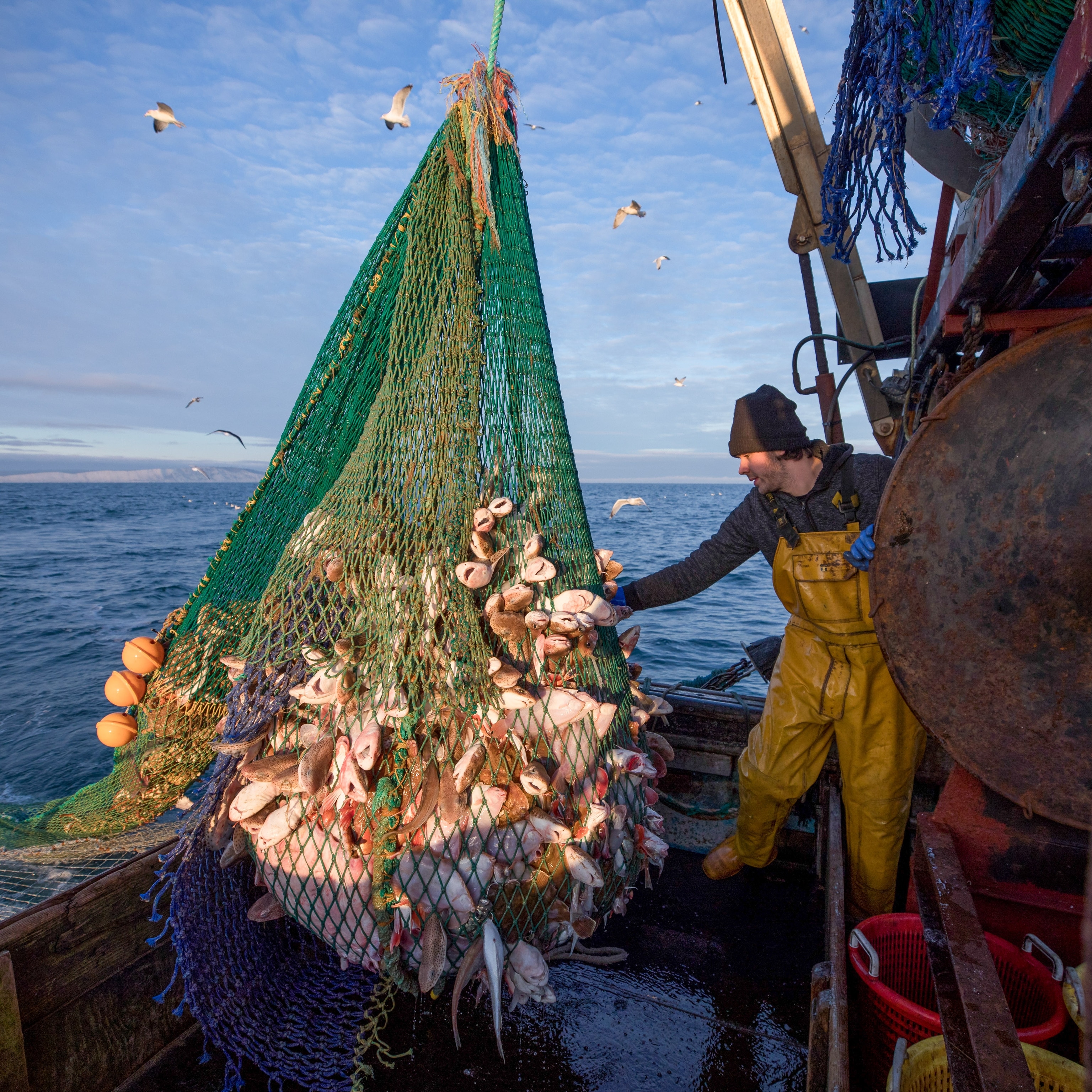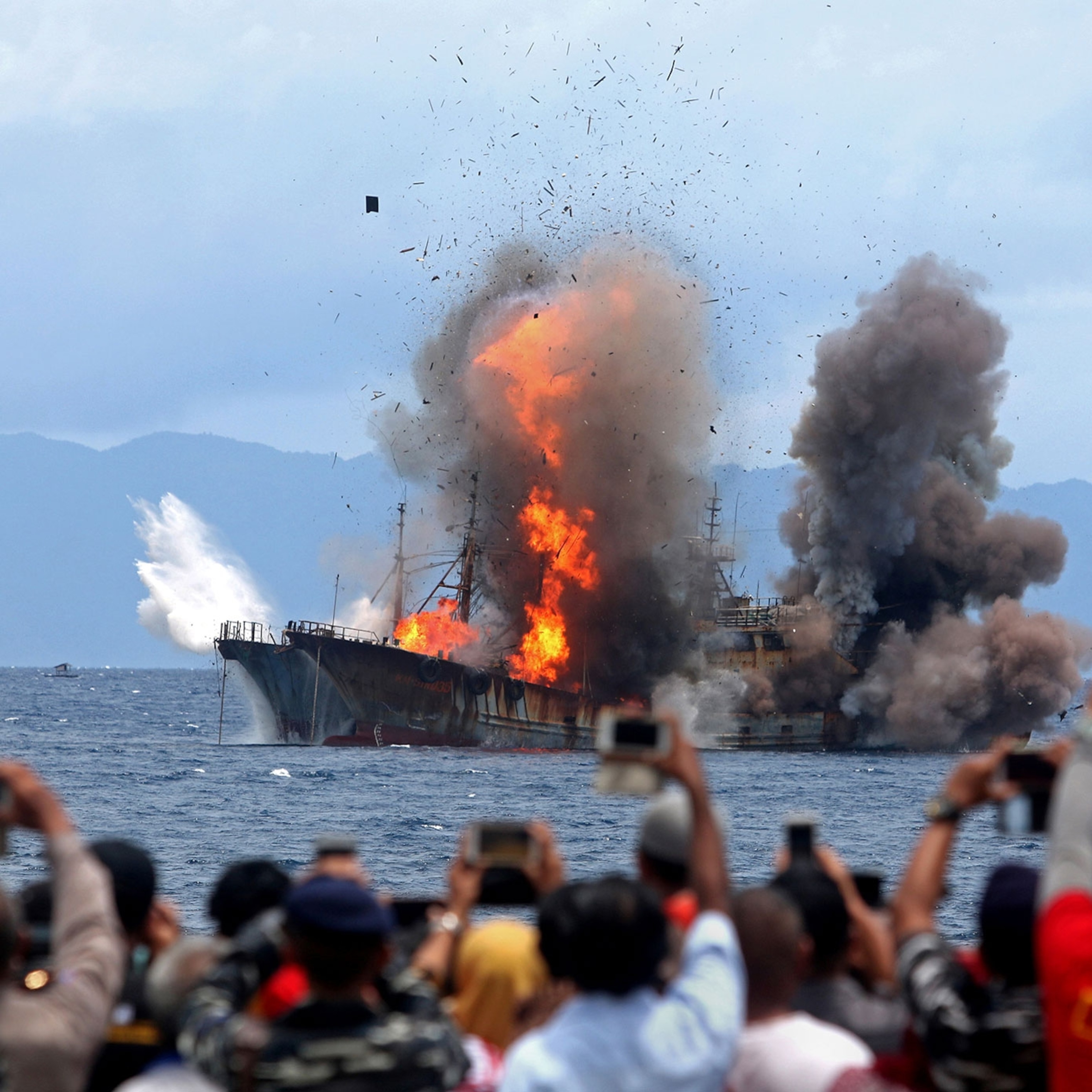Climate Change May Spark Global ‘Fish Wars’
Warming seas are driving commercial seafood poleward into waters controlled by other countries, setting up international conflicts.
Atlantic mackerel, a fatty schooling fish, for years has been caught by fleets in parts of Europe and sold around the world—where it gets pickled, grilled, smoked, and fried. It is among the United Kingdom's key exports.
But a decade ago, warming temperatures began driving this popular fish north, into seas controlled by Iceland. Almost overnight, this seafood gold began shredding relations between some of the world's most stable governments. It led to unsustainable fishing, trade embargoes, and boat blockades. It even helped convince Iceland to drop its bid to join the EU. And that was among friendly nations.
Welcome to the climate-change food threat you may not have considered.
In many parts of the world overfishing is already draining the ocean of important sea life. But a paper published today in the journal Science suggests potentially explosive ocean fish wars are likely to simmer across the world as warming temperatures drive commercial fish species poleward into territories controlled by other nations, setting up conflicts with sometimes hostile neighbors that are suddenly forced to share. That could lead to far fewer fish, economic declines and, in some areas, serious threats to food security.
"I've got a 3-year-old son, and sometimes it seems like he's better at sharing than countries are with fisheries," says lead author Malin Pinsky, an assistant professor of biology at Rutgers University in New Jersey.
In parts of the world conflicts over ocean fishing are "already rampant. It's been brewing under the surface," says Jessica Spijkers, a sustainability researcher with the Stockholm Resilience Center and co-author of the study. "People have died at sea because fishing boats are out where other boat operators didn't think they should be."
Warming waters threaten to make that worse, the authors say.
Growing Problem
Dozens of countries, thanks to climate change, can expect to see entirely new fisheries develop by mid-century, the new study suggests, with that number jumping to 70 or more nations by century's end. By then, many countries could draw nearly a third or more of their national catch from fish stocks that didn't exist in their waters just a few decades earlier.
In parts of the world where governments are volatile and protein from the sea is essential, this is likely to set up conflicts that could escalate into violence or actual wars that threaten national sovereignty. In parts of East Asia, where international relations already are fraught because of disputed maritime boundaries and illegal fishing, scientists predict some countries could see 10 major new fisheries for species or stocks once exclusively managed by other countries.
"Even right now, it's likely to already be a bigger problem than we realize," Pinsky says. "I just don't think we're prepared for this globally."
Fish Are Moving—Fast
Most countries control fishing or have agreements to share rights within a 200-mile exclusive economic zone around their coasts. But fish, of course, don't care about political boundaries, and when they cross borders tempers can run hot.
In the 1990s, after agreements to share West Coast fish collapsed, the United States and Canada faced a standoff over salmon. Canada accused Americans of overfishing and seized boats fishing in Canadian waters. The governor of Alaska accused its neighbor of resorting to "gunboat diplomacy." Canada, in turn, threatened to overfish its own rivers to keep American boats from nabbing the harvest. New England saw similar battles between the two countries over lobster.
But now climate change has hundreds of species around the world moving toward the poles in search of colder waters, sometimes by hundreds of miles. And fishing rules and regulations simply cannot keep up.
Longline catches of blueline tilefish, a lean and meaty species common in the southeast U.S., had been managed for years by federal regulators with rules that stretched only as far north as Cape Hatteras, North Carolina. But a few years ago, officials with the National Marine Fisheries Service were alarmed to discover the tilefish were being caught in mass as far north as Long Island—where there were no rules at all, says Jonathan Hare, with the Northeast Fisheries Science Center. Eventually, the government set emergency rules.
In 2016, the congressional delegation of several northeastern states complained to the Obama administration about an even odder situation. Black sea bass and summer flounder, once common in the southeast, had moved into the waters off Massachusetts, where local fishing boats could take but a scant few. Instead, quotas were still held by North Carolina fleets, which traveled to New England and caught 10 times more than local boats.
Still, these battles are internal. Once fish leave international waters all bets are off.
"Difficult to Manage"
Consider how quickly Europe's "mackerel wars" spun out of control. In the early 2000s, mackerel fishing was driven by the EU, Norway, and the Faroe Islands. But in a few short years, Iceland—not an EU member—went from seeing almost no mackerel to netting more than 150,000 tons. So the EU tried to make a deal with Iceland to share catches of the fish, infuriating Norway.
Angry and fearful over Iceland's fishing, the Faroe Islands withdrew from sustainable fishing agreements it made with Norway and the EU and started setting its own harvest limits. Scottish officials called the move "selfish"—one accused Iceland and Faroe Island fishing captains of acting like "their Viking ancestors." The EU responded with a trade embargo. Protesting fishermen surrounded one boat at a Scottish dock, refusing to let it offload. For awhile, North Sea mackerel fishing skyrocketed beyond what scientists considered sustainable.
"Even in the countries with the best of governments, those disputes are difficult to manage," Spijkers says. Many countries won't be so lucky.
With illegal fishing already common in parts of the world, it's clear existing rules don't always do a good enough job of managing fish that haven't moved. Once they have, Pinsky points out, international laws don't have mechanisms to encourage countries to work together—or even to do research so they can agree on where the fish are going.
"Even when there are enough fish to go around, what we've seen is that when countries can't cooperate, that often leads to competitive fishing—to a race to catch the fish when they're there," Pinsky says. "With climate change, there's potential for a future where disputes around fishing lead to less fish, less profit, less employment, and more concern about food supplies."
In many countries, one fish stock may move out while another moves in. Around the tropics, however—where millions of people rely on reef fish for their protein—scientists expect to see a loss of diversity and far fewer fish overall. How countries respond to that potentially desperate scenario is worrying to Pinsky.
"Conflicts that start out as being about fisheries may not necessarily stay that way," he says.




















